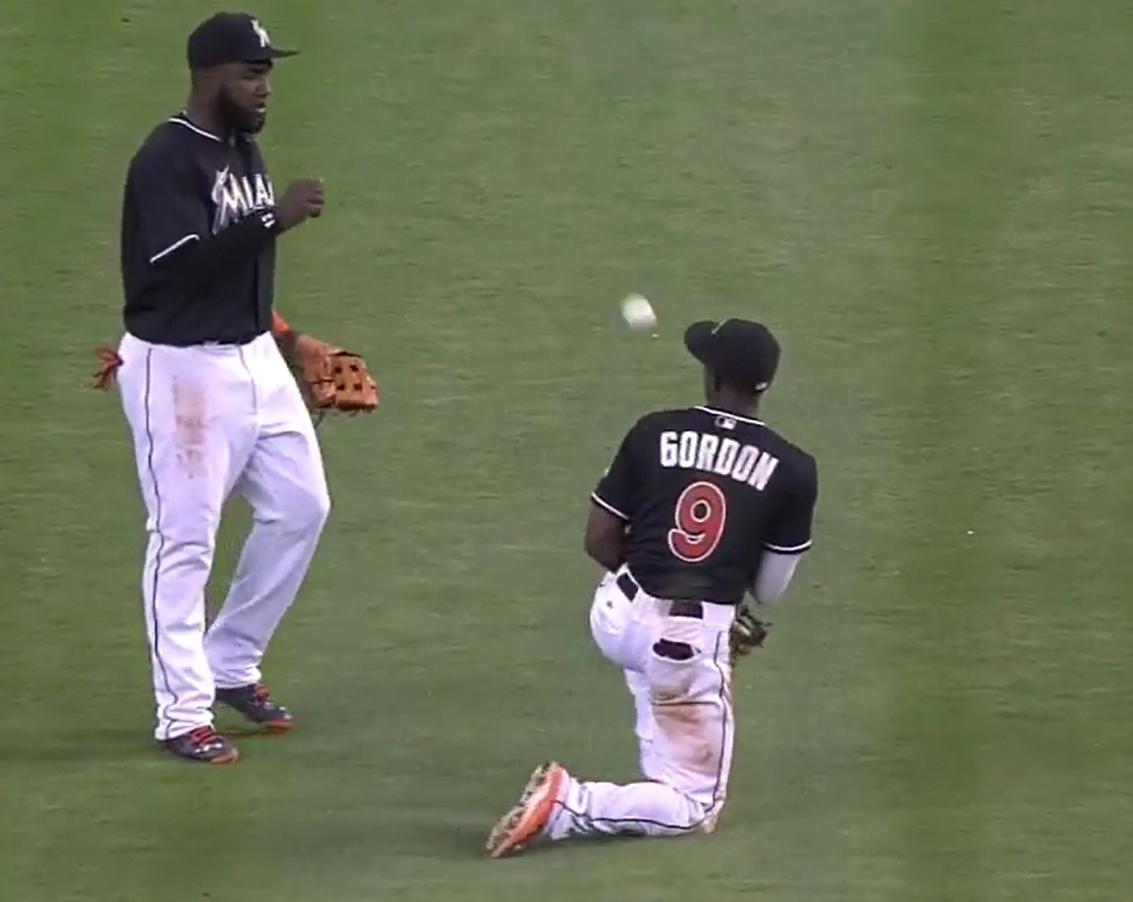Before the season, I wrote about Dee Gordon and how he might add value to the Marlins this season if certain benchmarks were met. The main items of concern I laid out was his ability to maintain his OBP and the Marlins ability to utilize his blazing speed on the base paths.
In my argument I chose not to account for Gordon’s fielding assuming we would see more of the same average to below average defense that Gordon had displayed in the past. It turns out, his defense is not only relevant, but arguably will be the driving force of his value for the remainder of the season.
Over the last four seasons, with 2014 being his first full season, Gordon amassed an average dWAR of -0.4 according Baseball-Reference.com. Over at Fangraphs Gordon’s historical defensive stats paint the same woeful picture. The metrics show that Gordon was one of the worst defensive second baseman last season. His UZR, an attempt at an overall defensive rating, was -3.4 last year. Just so we are clear negative is not good. The charts below followed by their brief explanations should hammer home just how much Gordon has improved defensively this season.

The table shows statistics collected by Baseball Info Solutions (BIS) and reported on Fangraphs. BIS created a zone for each position in which they believe a fielder could make defensive plays. Any ball hit in the fielder’s zone is called “Balls In Zone”. The metric “Plays” shows us how many of those balls in the zone were successfully completed by the fielder. Revised Zone Rating gives us the respective percentage and OOZ is plays the fielder made outside of his zone.
You can see that there has been some improvement here. Most notably Gordon has seemingly made a significant number of plays outside of his zone. In fact he has already almost made as many OOZ plays as he did all of last season. The next chart verifies this theory.

Inside Edge Fielding at Fangraphs breaks these zones into categories ranging from balls in play deemed impossible to field successfully to routine plays. You can read the chart just as well as I can explain it, but I will point out the significant increase in the percentage of successful plays being completed by Gordon in the “Remote” category. This backs up the OOZ plays made in the previous table. It also tells us that Gordon is not only making routine plays at a higher rate, but that he is also making the difficult plays as well.
I stated at the beginning of this post that Gordon’s value going forward might have to come from his new defensive prowess. My reasoning is based on the prediction that he will not be able to sustain his overall offensive production for the entire season and there are a couple of metrics that point to this notion. First, Gordon’s offense is being powered by an extremely high BABIP at .415 and one could estimate that this will not be sustainable for the entire season. Second, Gordon is attempting fewer stolen bases this season compared to last season. This year his stolen base per plate appearance ratio is at 11%. Last season it was 12.7%. This is not a huge difference, but if the trend continues it could be significant spread out over an entire season.
I will admit I am making some pretty big assumptions by declaring Gordon’s offense won’t hold up over a full season, but I think most of us can at least agree that he will most likely be unable maintain his current pace. However, if he does experience some regression in seems his new added defensive value could carry him the rest of the way. With that being said I know the grind of the season is real and fatigue is not limited to affecting batting performance. As the season drags on a few of those tough plays that Gordon is currently making might just slip away. Going forward, I still feel more comfortable saying that Gordon’s glove will be more reliable than his bat.
If all of this analysis seems a little unnecessary considering Miami’s record that’s because it is. The Marlins are presumably going nowhere this season so it probably really doesn’t matter who they have playing second base and it is definitely not like Gordon’s job is in jeopardy. However, injuries happen and trades happen. If Gordon were to come up in discussions we might now have a stronger grasp on what kind of actual value Gordon would add to another team. As Oprah says, “Knowledge is power.”
Next post: Julio Teheran Is BrokenPrevious post: Waiting for Superman: The AL All-Star Shortstop Conundrum





Leave a Reply